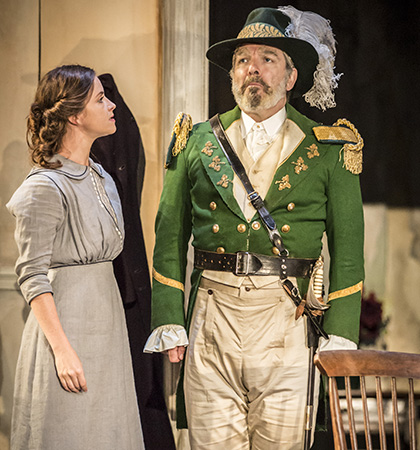IN this centenary year there is no better time to sample some of the many pieces of theatre that have Ireland’s Easter Rising of 1916 at their core.
And with Sean O’Casey’s The Plough and the Stars currently on the boards at the National Theatre in London there is no better example of such a work in which to indulge yourself.
 Judith Roddy (Nora Clitheroe) and Lloyd Hutchinson (Peter Flynn) in The Plough and the Stars Picture: Johan Persson
Judith Roddy (Nora Clitheroe) and Lloyd Hutchinson (Peter Flynn) in The Plough and the Stars Picture: Johan PerssonIn true O’Casey style, his 1926 play could instead be better described as a piece of social commentary, which focuses on a group of troubled Dubliners living in an inner city tenement, set against the backdrop of Easter Week 1916.
The writer, who himself did not fight during the Rising, but knew many of those involved, had previously played a significant part in establishing the Irish Citizen Army – hence the reference to the Starry Plough flag of the ICA in his play’s title.
However, he makes his exasperation at the rebellion clear in this play – directing it at all who took part, both the rebels and the British army, which drew harsh criticism in his homeland in its early days.
But regardless of the original controversy around O’Casey’s outlook, what is startlingly evident, through his central characters, is the strong association the writer assigned to the women of Ireland and the Rising – through their assorted roles, both direct and indirect, and the unfortunate, yet unavoidable, negative impacts it had on so many.
And in the National's revival, which opened this month, co-directed by Jeremy Herrin and Howard Davies as a celebratory project for the centenary year, the female cast continue to lead the way – providing forceful, polished performances at every turn.
Judith Roddy, as the devastated Nora Clitheroe has the most significant presence from the outset - keeping her hopes high, her tenement home in order and the men living there from each other’s throats.
But she as a casualty becomes only too apparent when her beloved Jack goes off to take his place in the Rising.
That move gradually leads her on a descent into utter madness, as she tries, in vain, to persuade her husband that she, as his wife and “dearest comrade”, should be more important than fighting and dying in Ireland’s war.
Similarly effective is Justine Mitchell in her remarkably timed performance as Bessie Burgess, the loyalist mother, positioned upstairs in the tenement block, who has lost her son to the First World War, where he is fighting for Ireland’s enemy and she is only to happy to shout about it.
Ultimately it is the relationship of these two women - to each other, to their men folk and to Ireland - that provide the crux of the tale and the most engaging scenes of the play – which is, at once, explosive, somber and entirely affecting.
The Plough and the Stars runs at the National Theatre until October 22. For tickets visit www.nationaltheatre.org.uk or call 02074523000

